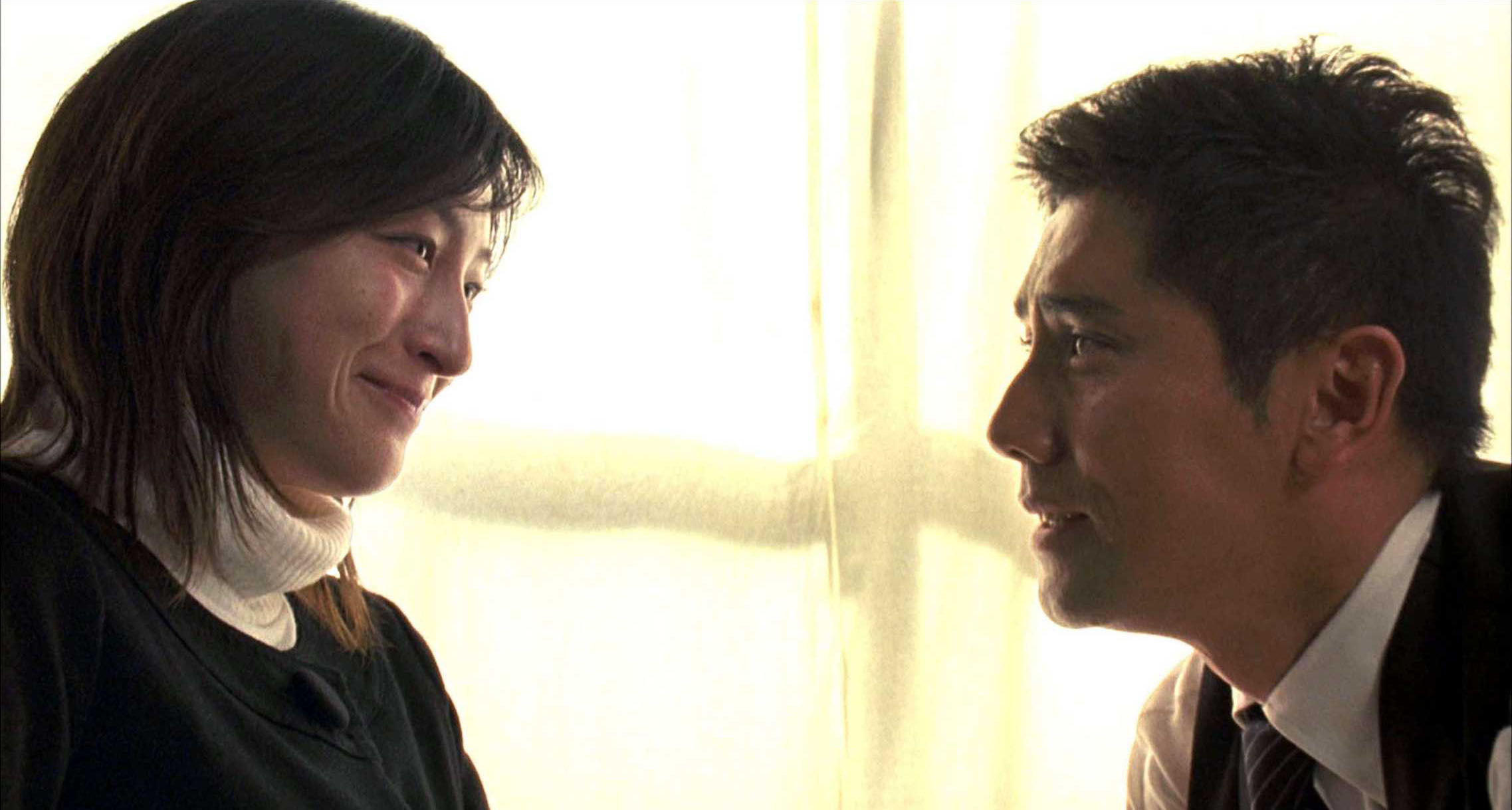By Chlotrudis Independent Film Society
Rating: 3.5 cats
Director: Yôjirô Takita
Starring: Kazuko Yoshiyuki | Kimiko Yo | Masahiro Motoki | Ryoko Hirosue | Tsutomu Yamazaki

Original language title: Okuribito
Country: japan
Year: 2009
Running time: 130
IMDB: http://www.imdb.com/title/tt1069238/
Jason says: “DEPARTURES feels like the sort of film that wins the Academy Award for best foreign language feature. It’s a good movie, just Japan-specific enough that the voters can feel like they’re awarding another culture, but accessible and mainstream enough that film sobs can argue that it’s another example of Oscar ignoring true excellence in favor of pretty-good-ness. And maybe it is. Nothing wrong with pretty good, and DEPARTURES is a pretty good pretty good film.
“Daigo Kobayashi (Masahiro Motoki) is a pretty good cellist, for that matter, though not so good that he can count on getting another job when the orchestra he plays in is dissolved. He and wife Mika (Ryoko Hirosue) move back to the house his mother left them, and he answers an ad for an ‘NK Agent.’ It’s not the travel agency he assumes it to be – ‘NK’ stands for nokan, or ‘encoffiinment’ – but boss Ikuei Sasaki (Tsutomu Yamazaki) pays well. He can’t quite bring himself to tell Mika exactly what his new job entails, of course.
“Which leads to one of the movie’s two main themes, the way we as modern people distance ourselves from death as a part of life. We are told how Daigo’s job used to be done by the family, then by undertakers, who now subcontract it out to businesses like theirs. So we see how the people who do this job are treated as outcasts, even though it is an important ritual. The other is how Daigo finds a new father figure in his boss, filling a hole that was left in his life since his father abandoned him and his mother when Daigo was six. There’s obviously going to be some connection between these two threads, but to writer Kundo Koyama’s great credit, there are multiple ways that they could connect, especially once we see that Daigo’s father inspired him to take up the cello, and that he does have a natural talent for his new job.
“Koyama and director Yojiro Takita do a nice job of building a pleasant atmosphere. The film opens with a bit of a flash-forward, so that our first impression of this job is respectful, though not so absolutely somber that we can’t see a bit of humor in the odd circumstances. There’s great affection between and for even the minor characters, although it’s generally not something that the filmmakers go out of their way to demonstrate, but what any observer would pick up from meeting these people. A storyline about the elderly mother of one of Daigo’s childhood friends who operates a public bathhouse more or less on her own is peppered with charming bits.
“I particularly enjoyed the way Diago’s and Mika’s marriage is portrayed; though the story does lean on the familiar gimmick of the husband not being fully honest with his wife more than one might like, it feels different here than it does in movies from TOKYO SONATA to SHALL WE DANCE? and further back. Daigo and Mika aren’t a couple hamstrung by the dictates of tradition, but a modern young couple who joke and treat each other as equals, more or less. Masahiro Motoki does a nice job of showing Daigo maturing, and I like how Ryoko Hirosue is able to make Mika into someone we like pretty instantly, even when she displays flaws that match Daigo’s in scale, if not form. I haven’t liked an on-screen married couple more recently.
“Tsutomu Yamazaki also hits just the right note; he pulls off making Sasaki funny without ever making him a punchline. He’s got the bearing of a man with a wealth of experience whom age has slowed some without ‘old man’ being the first thing that comes to mind when he appears. Kimiko Yo is nice as his assistant, and all the mourning familes are interesting to watch for their different reactions.
“DEPARTURES is a little rough in spots; after the initial flash-forward, this bits where Daigo is finding out where he’s working and learning the trade are played rather broadly, sometimes to the point of Motoki mugging to the camera. The comedy is toned down a little bit after that, and things run as smoothly as the story will allow. I do like a lot of the little details – the notches on the floor where Daigo practiced his cello as a child, for instance – and the way Takita shows the passage of time in a way that’s not jarring.
“It’s nicely off-kilter, though not enough to put people off. The frequently silly opening act hurts the film a little, but the film does a nice rebound into something that isn’t quite brilliant, but certainly heartfelt and satisfying. 4 cats
“Seen 23 June 2009 at Landmark Kendall Square #4 (first-run)“
Diane says: “What a coincidence: THE MESSENGER meets STILL WALKING! These two men in suits arrive when people have died….and a young married man deals with a father who rejected him. Occasionally maudlin, with overly sentimental music and some corny symbolism, but with many lovely moments, especially the repeated rituals of preparing the dead for cremation (translated as ‘encoffinment’). I wish that were an American custom! Self-indulgent in terms of editing and length, but worthwhile
for this fine look at our relationship to corpses. 3 cats”
